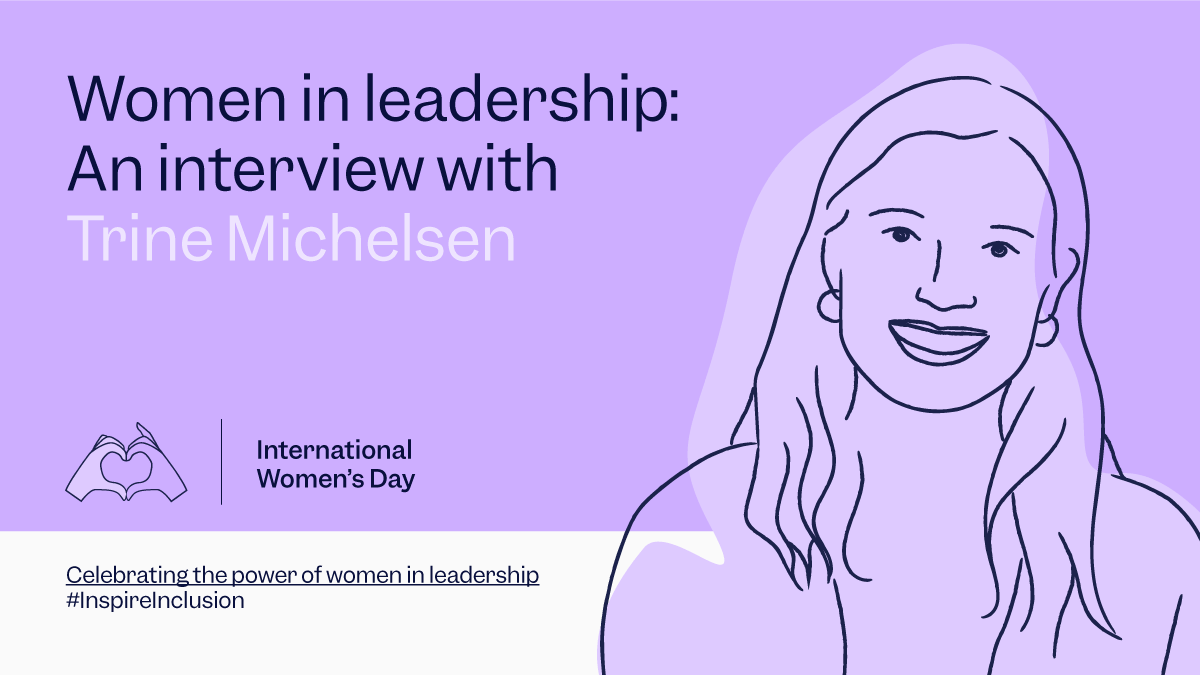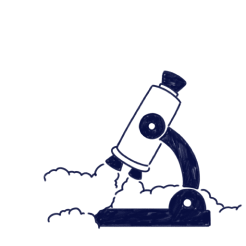
We had a discussion with our Finance and Accounting Manager about advancing workplace inclusion.
Motivated by a profound commitment to enhancing patients' quality of life, Trine Michelsen, the VP of Customer Success at Scilife, embarked on her journey with the company nearly four years ago as its first and only team member.
With a rich background working in the healthcare and medical devices field and an education in economics, international management, and marketing, she has skillfully built her team into the successful unit it is today.
As a female executive, we were interested in her thoughts on addressing the gender gap in high-ranking positions, her experiences in overcoming barriers during her career, and her ideas for enhancing workplace diversity and inclusivity.
According to McKinsey, due to gender disparity in early promotions, men end up holding 60% of manager-level positions in a typical company, while women occupy 40%. What factors do you think have caused a gender imbalance in the workplace, specifically amongst senior leadership roles?
I believe we are somewhat of an exception in this regard at Scilife because, in fact, we have many women in leadership positions here, even more so than men.
But looking externally, this is far from the case. Often, we focus on the changes that need to happen in society for this to improve but I think it is just as important to focus on what we can do individually, as women, to shift the scale and have more women in leadership roles. In my experience, women are often more inclined to undersell themselves. For example, a man with fewer qualifications than a woman often manages to sell himself much better.
They manage to appear more confident and secure positions that perhaps a woman, who might be more hesitant, doesn't. We don't promote ourselves as effectively. And when we do make an effort, it's sometimes viewed negatively, as if we're too aggressive or trying too hard. I think this is an area where we, as women, still have work to do: to trust ourselves more, not to undervalue our capabilities, and to support each other more openly.
We often feel pressured to be perfect in every aspect of our lives because we juggle so many roles. However, there's a positive shift happening. Young men and boys are starting to share these responsibilities, recognizing that they too have a part to play in changing these dynamics.
This change is gradual but essential, and it might be a generational shift towards recognizing that women have been their own harshest critics. We need to encourage one another to stand tall and acknowledge our worth.
Have you faced any barriers in your career due to being a woman? If so, how did you overcome them?
I would say that, in my experience, I've been fortunate not to encounter any hiring-related issues due to being a woman. However, I did face challenges at a previous workplace, especially related to maternity leave. Back then, paternity leaves were just a few days, and maternity leaves were 16 weeks, and I noticed a significant disparity when returning from my second maternity leave.
Upon my return, it felt as though I was being penalized simply for having taken maternity leave. My boss suddenly expected me to travel twice as much as before, despite no one else having such demands placed upon them.
It felt like a punishment for having taken time off to have a child, as if I was being forced to choose between my career and my personal life. This was the same individual who expected female employees to work very long hours, just because he did so himself. This highlights a broader issue of not valuing work-life balance and not assessing performance based on objectives.
Throughout my career, I've learned that empathy and flexibility from a leader can inspire employees to give their best. Understanding that an employee is more than just their job title, recognizing their family needs or personal circumstances, can make a profound difference in their performance and loyalty. If you do those things as a leader, that employee is going to give you their 3000%.
I also observed bias against women in the hiring process, particularly those who were recently married and likely to start a family soon. Qualified female candidates were often overlooked in favor of male candidates, due to the potential for maternity leave, despite the female candidates being more qualified.
How can leaders and organizations more effectively challenge and change these barriers to ensure inclusion?
I believe the key is to see an individual not as a gender but as a person. When hiring someone new, promoting someone, or making any decision, the focus should be on the individual's attitude, talent, and contributions, not their gender or the challenges they may bring. Flexibility is crucial because if you want people to stay with you, you need to empathize and understand that there may come a time when they need to adjust their life, regardless of whether they are a man or a woman.
Business leaders must listen and see what their employees need. Treat them as a person, not just as a man or woman, ensuring gender equality, offering equal pay for equal work, and establishing clear policies so that a man holding the same position is not paid more simply because he is a man. It's about examining salaries to address any inequalities and having the right policies in place.
I remember, I could tell you terrible stories about comments I've heard in previous companies due to the lack of a sexual harassment policy. I've been in sales meetings where men would sit in the back, rating their female colleagues as they passed by. This was not so long ago, maybe 10 or 15 years, but even today, you might find such behaviors in some companies. Having clear policies about what is right and wrong is essential.
How important have allies been in your career, and what actions can everyone take to be a more effective ally for women?
Certainly, the best ally is always someone who sees you as an individual, who looks beyond gender to recognize what you bring to the table as a worker and how they can empathize with you to bring out the best in you. It involves someone who helps you adapt your professional life to your personal life when necessary, showing flexibility and understanding.
In my experience, the transition to a new job highlighted the importance of such allyship. My former boss understood my need to work from home so I could balance my responsibilities with my daughters, knowing that when required, I would always be willing to go above and beyond to meet a deadline. This understanding and support were key for me, reinforcing the belief that giving support leads to reciprocal effort and dedication.
To be an effective ally for women, actions speak louder than words. Hiring practices should not differentiate based on gender; instead, they should focus on talent, potential, and cultural fit. Furthermore, addressing salary equity is crucial, ensuring that men and women in equivalent positions with similar talents are paid equitably.
In your opinion, what’s a good indicator to measure gender equality in the workplace?
A good indicator of gender equality in the workplace, in my opinion, is evident when entering a company and observing established policies regarding the talent acquisition process and measures against sexual harassment. It's about having proactive measures in place to monitor and address inappropriate behavior.
Another key aspect is the implementation of inclusive policies that cover recruitment, promotions, and salary structures, ensuring that these processes are equitable and inclusive for everyone. A truly inclusive workplace ensures that every individual, regardless of their position or gender, has a voice which is something I really like about Scilife.
A personal experience that highlights this for me was my interaction with Filip, the CEO at Scilife, where from the outset, I felt that my opinions were valued. Despite being new and still learning about the product, I found myself in discussions with the CEO, who was open to my feedback. This openness and inclusiveness from leadership motivated me significantly, reinforcing the idea that everyone's input is valued.
However, it's not just about having policies for show; many companies might have numerous policies that look good on paper but are not actively enforced or practiced. The real test of inclusivity and equality is in the active practice of these policies, ensuring they are not just for appearances but are genuinely embedded in the company culture and daily operations.
Reflecting on your career, what stands out as your biggest achievement or the accomplishment you're most proud of?
Reflecting on my career, I take pride in many accomplishments, such as creating patient guides and materials for medical professionals that have made a significant difference in handling complex situations with external partners. My passion has always been to work on projects that improve the quality of life for end-users, not just focusing on products but on the real impact on people's lives.
One of my proudest achievements, however, is my journey in Customer Success. Starting in an area where I had no prior experience, I've learned and grown tremendously, leading to now managing a team of six people. Especially notable is the work done with a group of women; we all came from different backgrounds, not necessarily from the SaaS industry, and learned a lot together. My path in building the Customer Success team from scratch, learning the product inside and out, engaging with clients, and looking forward to what we still aim to achieve fills me with pride.
What would your advice be to women who are trying to achieve their career ambitions?
My advice to women aiming to achieve their career ambitions would be to trust in yourself. Learn everything you can and don't second-guess your abilities. Move forward confidently. If there's something you're passionate about, pursue it without hesitation. Don't allow your fears or what you don't know to limit you because you can learn along the way. I'm not saying you should aim to be a neurosurgeon without studying medicine, but don't impose unnecessary limitations on yourself.
If you're passionate about something and want to pursue it, even if it's not in your field of study or you haven't studied technology but are drawn to it, remember that many skills, especially soft skills, can be transferred and applied in various contexts. Embrace and utilize these skills.
Believe in yourself and go for it. Don't undervalue yourself—there are plenty of others who might do that for you. Don't be one of them. Give it your all. When you know you've put everything into achieving your goals, you'll have no reason for regret or to wonder "what if."
Is there anyone who has inspired you in your career?
I would say that I am greatly inspired by the people around me. I tend to observe my surroundings closely, paying attention to how people argue, navigate critical situations, and their overall demeanor. My environment is a significant source of inspiration for me. Especially here at Scilife, we are fortunate to have a team of highly qualified, dedicated, and intelligent individuals.
I draw inspiration from those I work with daily, learning from observing how they handle various challenges, thinking to myself, "Wow, I hadn't considered that approach before," or "What an interesting way to solve that problem—I should try to incorporate some of that into my own methods." I pay close attention to these moments, drawing lessons from them. Seeing my colleagues handle various situations daily is genuinely inspiring.
Why is it important for all companies to strive to have good gender diversity both within their workforce and among their leadership?
We all bring different perspectives and strengths to the table, influenced in part by our gender. An equitable balance is essential; having a workforce or leadership composed entirely of one gender isn't ideal because diversity in thought and approach benefits everyone.
As a parent to two daughters, I reflect on the changes in societal attitudes towards maternity leave and workplace flexibility, grateful for the progress made towards accommodating the needs of working parents. These advancements are partly due to the awareness raised by movements advocating for women's rights, leading to significant achievements in gender equality over a relatively short period.
I still remember how balancing family life with professional responsibilities was extremely challenging for me. It was very tough, especially after the birth of my eldest daughter. I barely saw her each day because I worked far away, and there were no options for flexible scheduling or leave. It was truly awful.
Thankfully, things have improved now, but there's still a way to go. The COVID-19 pandemic has brought about changes, such as remote working, which has significantly improved the balance between family and work life. However, we still need to push further, especially in promoting work-life balance and ensuring men and women in leadership positions can take parental leave without stigma. Implementing and adhering to policies that support this balance is key to furthering gender diversity and equality in the workplace.
What does International Women’s Day mean to you?
To me, International Women's Day is a day to commemorate all the progress made toward gender equality, but it's also a day for reflection on what still needs to be achieved. We are not yet at a point where equality is a reality in every aspect and every workplace. While some companies, like ours, have made significant strides, discussions with individuals from other organizations reveal that gaps still exist. I'm convinced there are still women who, during job interviews, hide their recent marriage or other personal circumstances for fear of discrimination based on potential maternity leave expectations.
These concerns, though not legally permissible to be raised by employers, unfortunately, influence hiring processes and career advancements. The fact that some women feel they must conceal significant personal life events until after securing a job highlights ongoing biases.





